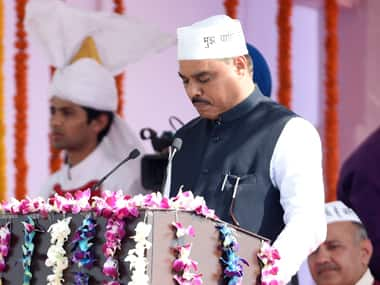Delhi’s Law Ministers seem destined to get into trouble with the law. In the 49-day avatar of AAP-1, Arvind Kejriwal’s Law Minister Somnath Bharti got into a flap for being associated with spam sites; he landed in more hot water when, one night, he went after African women for allegedly running drugs and prostitution rackets. For his unsavoury midnight exertions, Bharti got no reprimand from his boss. But Kejriwal avoided another controversy by denying Bharti a cabinet berth when he returned to power last February with a thumping mandate. Kejriwal has not had better luck with his second law minister in AAP-2. Jitender Singh Tomar has come under a cloud for allegedly possessing a fake law degree. He was arrested today (9 June) by the Delhi Police on the basis of a criminal complaint filed by the Bar Council of Delhi over his “fake” degree. According to a report, Tomar has being accused of transgression of IPC sections 467 (forgery), 468 (forgery with purpose of cheating) and 120 (B) (criminal conspiracy). [caption id=“attachment_2286780” align=“alignleft” width=“380”]  Tomar during his swearing in. AFP image[/caption] AAP is already screaming blue murder, alleging that force was used against Tomar, and that his arrest was in retaliation for the AAP’s government moves against corruption. Whatever the charges or counter-charges, one thing is clear: it is yet another manifestation of the power struggle between Kejriwal’s elected Delhi government and the centrally-appointed Lieutenant Governor Najeeb Jung. It is equally clear that both parties are over playing their hand. And they have been doing so for a while. The Lt Governor had no business trying to appoint secretaries and even officers to the anti-corruption bureau despite the opposition of the elected government. Whatever the law may say – and the courts will surely have the final say on this – common sense suggests that an elected Chief Minister cannot be denied his say on who his key officials should be. The arrest of Tomar in the fake degree case may also be a bit premature, and possibly needless. It has only given Kejriwal another opportunity to point fingers at the centre. But Arvind Kejriwal is not your poor-little-wronged-guy either. He has been spoiling for a fight ever since he was given a mandate, and he has gone about demanding more powers for Delhi in the wrong way. He has failed to realise that Delhi is the country’s capital over which the centre cannot cede full control. Instead of seeking a compromise solution, he has been busy riling the Lt Governor and the centre. His needless provocations have put him in opposition to the Lt Governor, making the running of Delhi difficult. The bureaucracy is caught between two belligerents, and this cannot be conducive to good governance, which Kejriwal swears by. On the immediate issue of Tomar’s arrest, Kejriwal surely cannot claim the high moral ground. Ever since allegations surfaced in April about Tomar’s “fake degree”, Kejriwal showed no alacrity in showing Tomar the door till he got his name cleared. While this is what all governments do, Kejriwal always claimed a higher commitment to probity. But he did little. In the case of his earlier Law Minister, Somnath Bharti, too, he showed no inclination to even censure him for his behaviour. The problem with Kejriwal is that he wants to don the mantle of victimhood when his law ministers have clearly much to answer for. He wants to be in a state of perpetual opposition and belligerence when the need of the hour is statesmanship and a willingness to compromise. It appears that he wants a fight more than a solution. Kejriwal’s deputy, Manish Sisodia, said the police action of arresting Tomar was unwarranted when there was no danger he would run away or avoid questioning. That’s true, and the Delhi police should explain the need for his arrest pending an investigation. On the other hand, Kejriwal has not covered himself with glory in the way his party has reacted to Tomar’s alleged crimes either. The tragedy of Kejriwal and his Aam Aadmi Party (AAP) is that their response is no different from that of other Indian parties when cornered over an issue. They will scream conspiracy and make counter-charges. AAP is now no different from any other political party in its responses to wrongdoing. Its crusade against other people’s corruption will lose its legitimacy if it cannot act against wrongdoers at home.
Arvind Kejriwal seems to be particularly unlucky with his law ministers. But the arrest of Jitendra Singh Tomar by Delhi police is probably a bit premature and needlessly escalates the war between the Lt Governor and the Delhi government
Advertisement
End of Article
Written by R Jagannathan
R Jagannathan is the Editor-in-Chief of Firstpost. see more


)

)
)
)
)
)
)
)
)



